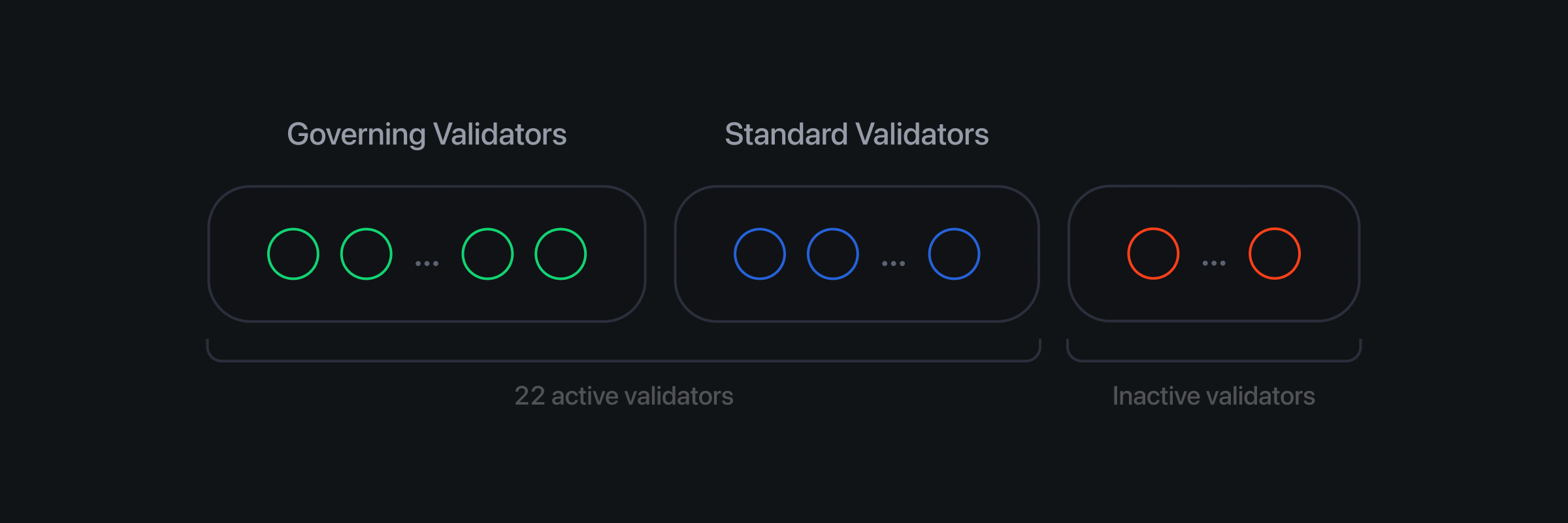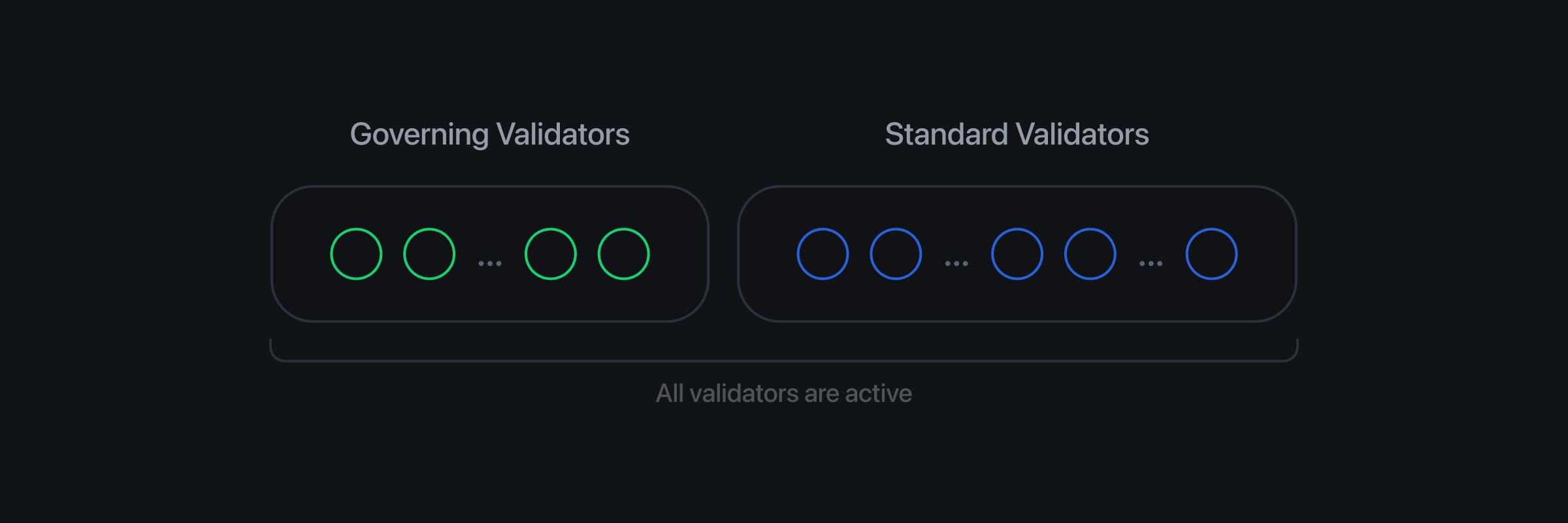Key Points
- Welcome to Part 3 of an editorial series by Ronin head researcher Phuc Thai! In this article, Phuc takes a deep dive into decentralization on Ronin.
- In this article, you’ll explore the role of Validators, Validator Candidates, Governing Validators, and more on Ronin.
- Ronin is an Ethereum-aligned blockchain forged for gaming. Share this article with any friends, developers, or gamers who might be interested in how Ronin works under the hood.
Decentralization in blockchain refers to the distribution of power, authority, and control across multiple participants in a network rather than being concentrated in a single central authority. This fortifies Ronin's security by eliminating vulnerabilities associated with a singular point of failure or control.
Decentralization helps make Ronin antifragile. A constant reminder in our minds is: What would happen if Sky Mavis disappeared suddenly? We should aim to achieve a sufficiently decentralized state that the protocol survives and continues to flourish, incentivizing multiple capable teams to contribute to Ronin’s vision even without the core developer or founding team.
However, increasing the level of decentralization often necessitates trade-offs, such as slower response times, decentralized decision-making, and governance processes – all of which may delay the development process.
It is important to note that the ecosystem should be of great value to even warrant a high degree of decentralization. There is an inflection point in a protocol’s maturity where decentralization becomes needed and even a great catalyst for the next wave of growth.
We are operating within the web3 gaming sector, one of the most dynamic industries in the world. Thus, during our early stages, decentralization manifests as a spectrum across different aspects of Ronin. Nevertheless, we are committed to progressively enhancing the decentralization of the Ronin chain as the network matures.
In this article, we will delve into the decentralization of three key roles on Ronin:
- Validators: who are responsible for validating and finalizing the transactions.
- Governors: who govern protocol upgrades and alterations.
- Game and dApp developers: who build decentralized applications and games on Ronin.
How Validators Work on Ronin
Validators are responsible for validating and finalizing transactions. Through consensus mechanisms, validators ensure the integrity and security of the decentralized ledger, safeguarding against fraud activities and ensuring trust among network participants. The decentralization of validators is fundamental to the resilience and robustness of the Ronin network.
In May of 2021, Ronin began using the Proof of Authority (PoA) consensus mechanism. In Ronin’s PoA consensus mechanism, Sky Mavis and its community hand-selected reliable validators to maintain the network and verify transactions. However, the PoA consensus mechanism required an enormous amount of trust in the chosen group of validators. That’s why Ronin upgraded to Delegated Proof of Stake (DPoS) in April of 2023.

DPoS brought greater decentralization among validators. Today, there are 12 Governing Validators on Ronin who were selected through a PoA style. In addition, there are also 10 available Standard Validator slots for anyone, anywhere to become a Ronin validator. To become a Validator Candidate, a RON holder needs to stake at least 250,000 RON. Other RON holders can delegate their RON to Validator Candidates, thereby increasing the validator’s total stake. The validators with the highest stake then become Standard Validators. The remaining Validator Candidates are inactive and do not participate in securing the network. At the time of writing, the lowest amount of staked RON by a Standard Validator sits at about 8.1 million RON.
This might seem like a big number, but it gets even more interesting when you consider that RON holders can delegate their RON to a Validator Candidate. A Standard Validator may only provide ~250,000 RON, while third-party RON holders can contribute millions more. As a result, the Ronin community is able to “vote with their RON” in a manner of speaking: they can delegate their tokens to the validators of their choice. More points for decentralization.

In the future, we plan to increase the decentralization of Ronin by progressively increasing the number of validators and reducing the threshold to become one. We have proposed REP-0010: Introducing Rotating Validators, which has passed the soft off-chain voting phase among validators and is now progressing into the implementation stage.
On Ronin, validators have two key responsibilities: block production and finality voting. Currently, 22 validators are chosen daily to perform both tasks. With the introduction of REP-0010, we're implementing a new framework where block production and finality voting are distinct functions. In the new design, 22 validators are randomly designated to produce blocks each epoch – or about every 10 minutes. The selection frequency of a Validator Candidate depends on their total staked amount. While all validators retain the ability to participate in finality voting, the weight of their votes is proportional to their staked amount.
Crucially, we've incorporated disincentives to counteract the centralization of staked RON within the top validators. We're instituting a cap on the power of each validator, limiting it to 1/22 of the total stake. For example, if a validator's staked amount is equal to or less than 1/22 of the total stake, their weight aligns proportionally with their staked amount. On the other hand, if a validator's staked amount exceeds 1/22 of the total stake, their weight is capped at 1/22 of the total stake. This design discourages the concentration of staked RON among the top validators, as delegators may experience a decrease in APR when staking with validators possessing disproportionately high staked amounts.
Governors and Protocol Developers
The Ronin chain operates under the governance of 12 governing validators who manage protocol upgrades and alterations. These enhancements may encompass advancements in the network's security, scalability, and overall functionality. Within the Ronin ecosystem, any upgrades must undergo an on-chain proposal, necessitating the approval of at least 75% of the governing validators. Decentralized governance ensures that the Ronin ecosystem remains adaptable and responsive to the evolving needs and preferences of its users. By allowing stakeholders to participate in decision-making processes, Ronin promotes transparency, inclusivity, and consensus-driven development.
Ronin operates on a fully open-source model, welcoming contributions from anyone interested in advancing the platform. The dedicated Ronin Core team at Sky Mavis spearheads most implementations. Each proposed change undergoes meticulous scrutiny by this team, focusing on factors such as feasibility, alignment with network objectives, and potential impact.
Before progressing to the implementation phase, proposed ideas undergo a rigorous evaluation process known as the Ronin Evolution Proposal (REP). The REP process serves as a conduit for channeling community-driven ideas and innovations into actionable initiatives. Community members wield the power to initiate a REP, thereby providing an inclusive platform for diverse perspectives and insights to shape the future trajectory of the Ronin ecosystem.
Game/Dapps Developers
Game and Dapp developers specialize in crafting, constructing, and launching gaming experiences and decentralized applications (Dapps) on Ronin. Currently, games and Dapps on Ronin need to be whitelisted by Sky Mavis before deployment. This ensures a curated and quality-driven ecosystem and safeguards users on Ronin from potentially subpar or unqualified games and Dapps. By subjecting all submissions to thorough scrutiny and review, Sky Mavis upholds standards of excellence and reliability within the Ronin ecosystem, fostering a trusted and secure environment with which users can engage.
Looking ahead, there are envisaged plans to transition towards a more inclusive model that empowers a broader spectrum of developers to contribute to the Ronin platform while still maintaining the high level of curation and security. This future vision entails opening Ronin's doors to enable a diverse array of builders to unleash their creativity and innovation, thereby enriching the platform with a vibrant tapestry of games, experiments and dApps that cater to diverse interests and preferences.
Disclaimer: Please note that this content is presented or otherwise made available to you on an “as is” basis for general informational and educational purposes only, without representation or warranty of any kind. This content should not be construed or used as financial, legal, or other professional advice, nor is it intended to recommend the purchase or use of any specific product or service. You must seek your independent advice from appropriate professional advisors. Where this article is contributed by a third party, please note that those views expressed belong to the third party and do not necessarily reflect those of Sky Mavis. Please refer to our Terms of Service for more information.






